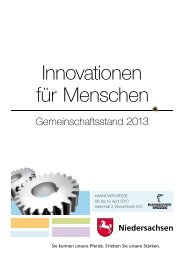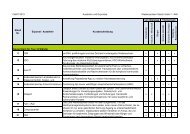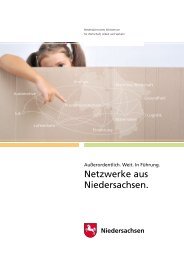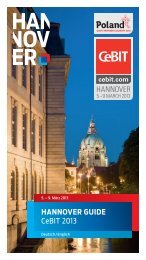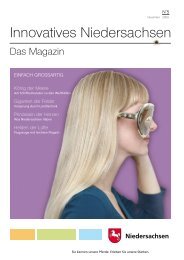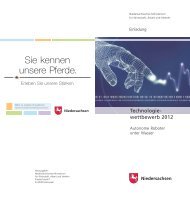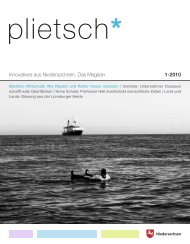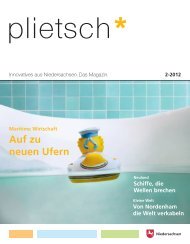magazine for business and investment - Innovatives Niedersachsen
magazine for business and investment - Innovatives Niedersachsen
magazine for business and investment - Innovatives Niedersachsen
Create successful ePaper yourself
Turn your PDF publications into a flip-book with our unique Google optimized e-Paper software.
Companies<br />
<strong>Niedersachsen</strong> Global 53<br />
Image: Herfurth & Partner<br />
Ulrich Herfurth, German Attorney<br />
Technology Licensing in Germany<br />
A company can choose to either develop its own innovations or purchase the desired innovation<br />
from another party. The German attorney Ulrich Herfurth about the details.<br />
A company can choose to either develop its own innovations<br />
or purchase the desired innovation from another party.<br />
Every cooperation contract which includes the transfer of<br />
technology <strong>and</strong> usage of patents, design, trademarks <strong>and</strong><br />
br<strong>and</strong>s, must also contain provisions regarding the appropriate<br />
licensing agreement.<br />
Depending on the nature of the <strong>business</strong> activity, the<br />
license can refer to the production or sale of the products as<br />
well as to the usage of trademarks. The content of a license<br />
is generally considered to be a commodity, which is owned<br />
solely by the licensor (know-how) or a right to which he is<br />
entitled (patent, prototype protection, trademark <strong>and</strong> br<strong>and</strong>).<br />
Due to the provisions of national <strong>and</strong> international<br />
competition protection law, there may be limitations on the<br />
unrestricted construction of license agreements between<br />
contract parties. The strict German competition protection<br />
law expressly considers the agreement of the contract parties<br />
to be anticompetitive; if the limitations placed on the content<br />
of the licensed rights (i.e. patents or company secrets) are<br />
excessive. Even non-challenge clauses against the rights of<br />
the licensor may be anti-competitive <strong>and</strong> there<strong>for</strong>e ineffective.<br />
Also, a clause prohibiting the licensee from manufacturing<br />
or distributing competing products is usually in breach of<br />
competition law <strong>and</strong> requires justification. For this purpose,<br />
the European Union has issued a block exemption regulation<br />
<strong>for</strong> technology transfer. The amount of the license fees<br />
should be negotiated between the parties based on their<br />
commercial interests.<br />
The benchmark is often a combination of what the<br />
licensee saves in his development expenses <strong>and</strong> the amount<br />
of benefit he can obtain through the production <strong>and</strong> sales<br />
of a product made from the knowledge acquired from the<br />
licensor. The interest of the Licensee corresponds most closely<br />
with a license fee, which is based on current sales of<br />
replica products. The Licensor also partakes in this way in<br />
the exceptional success of the licensee. However, he runs the<br />
risk of getting very little revenue if the Licensee’s <strong>business</strong> is<br />
not profitable. However, if he wishes to avoid this risk, it is<br />
better to agree on a fixed payment. The combination of both<br />
methods is also possible. To cover the expenditure associated<br />
with the initial technology transfer, it is recommended to<br />
agree upon a down payment. Finally, it is also important to<br />
note in the calculation of royalties, that withholding taxes are<br />
frequently imposed on royalty income.<br />
Contact<br />
Ulrich Herfurth herfurth@herfurth.de<br />
www.herfurth.de




